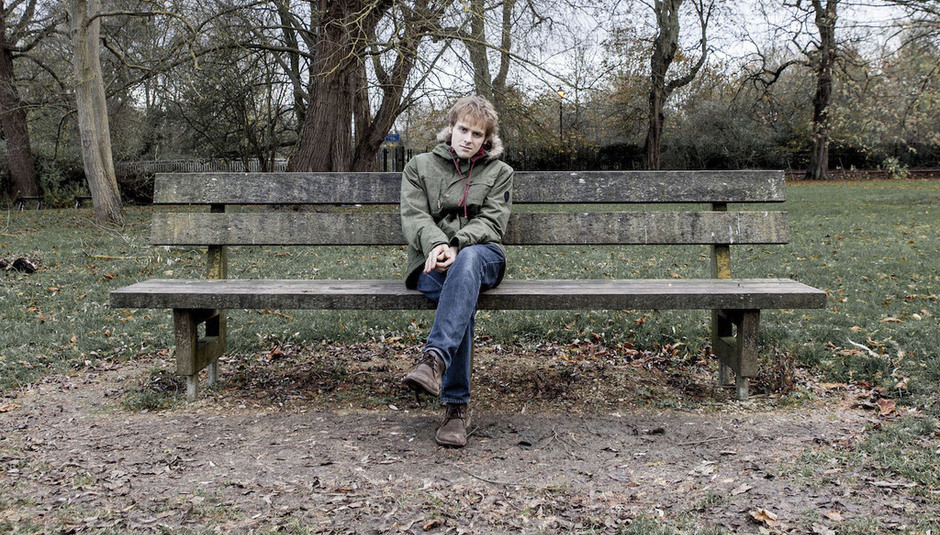The Brudenell Social Club in Leeds is a noisy place to be at tea time. In the venue’s main room The Doors Alive – “THE most exciting, authentic, charismatic and (self proclaimed) sexually magnetic tribute band to pay homage to 1960s rock titans The Doors” – are soundchecking with ‘Light My Fire’. Meanwhile, in the smaller Games Room, Kiran Leonard and his band are working their way through a test run of kraut groove odyssey ‘Geraldo’s Farm’.
Clearly, this hasn’t been orchestrated as some kind of sonic battle between the old and the young, the nostalgic and the new. But even if it had, it's no contest: Kiran Leonard is one of the most original and captivating songwriters in the UK, and in a couple of hours he’ll be onstage stamping his feet and tearing his lungs out into the mesmerising virtuoso jazz-punk of ‘Don’t Make Friends With Good People’, from his self-recorded second album Grapefruit. It's a song so powerful it makes you want to dance, cry and run for cover at the same time, a gripping ten-minute snapshot of the frenzied magic Leonard can muster.
“I don’t have any delusions of grandeur about it,” the 20-year-old from the outskirts of Oldham says backstage an hour or so before showtime. He's reflecting on the fact that tonight he starts his biggest ever tour with a sold out gig, and tomorrow will finally release the already widely acclaimed Grapefruit. Modesty is an achievement in itself for an artist you can’t fail to be impressed by, regardless of whether or not you actually like his music.
Because before you even consider the actual sounds he makes, there are some remarkable facts about Kiran Leonard that most fans will already be familiar with: at age five he started playing mandolin, by ten his older brother had got him listening to Boredoms, Boards of Canada and all manner of bizarreness in between. He’s been writing songs and recording at home at an industrial rate pretty much ever since. His first ‘proper’ album Bowler Hat Soup was originally released when he was 16 and the follow-up, Grapefruit, spent years in gestation alongside numerous stopgap recordings that have made their way onto Bandcamp.
But the numbers would mean nothing were it not for the sheer quality and ambition of the music. The dizzying prog-folk of Bowler Hat Soup features Leonard playing 22 different instruments, and though the parameters of Grapefruit are narrower, it still finds room for the sweeping string-led melodrama of ‘Caiaphas In Fetters’, and the 16 minutes of pounding math-rock and intoxicating drones that make up ‘Pink Fruit’. Its complexity is no bar to it being one of the year’s most vivid, moving and brilliant breakthrough records.
“I never think it’s a good idea to have ‘challenging’ as the end point for a piece of music because it’s going to end up just sounding wanky, but at the same time there are things that are appealing to me because they are challenging,” Leonard says about the unusual shape his songs tend to take. To illustrate, he animatedly recites a Women bassline in 13/8, citing it as a recent fave.
“I don’t think you should sit down and be like, ‘Oh yeah, I’m going to sit down and write all this shit with different time signatures in it and everyone will think I’m dead clever’, but sometimes songs with loads of time signature changes and odd chords in them are just appealing,” he explains. “You can always tell the difference between bands that are like, ‘We wrote this in 5/8 because it sounds great in 5/8’ and ‘We wrote this in 5/8 so you know we know what 5/8 is’.”
In seeing distinctions like this, Leonard is aware that he can be as prodigious and prolific as he likes, but it won't amount to much without a clear sense of purpose. His songwriting is methodical, with tracks written to fill gaps on albums he's already sketched out in his head. So as unusual as his songs often sound, it's never oddness for its own sake: rather, they're the byproduct of Leonard’s quest to articulate the scenes in his head in new and original ways.
“I take what I do very seriously and I think what I do has worth and – I don’t know,” he trails off, taking care to not misspeak as he explains his affection for the unusual.
“You find something interesting and engaging and you try and expose yourself to a lot of it. I do think that’s important. I think I said this in the past where I’ve got a real issue with an attitude that’s very common for people who are just like” – and here he adopts the tone of an all-purpose indie-rock bore – “‘Oh well, you know, I just write songs, and if anyone else likes them it’s a bonus’. I think that’s a really cowardly, terrible way to look at your – like, I don’t think that. I think I try really hard to do my best and I want people to think that the songs are really good. But at the same time I don’t think I’m the fucking messiah.”
The way Leonard sees it, the adventurousness evident in his music is less a result of his own innate genius and more to do with the fact that the lucked out, born into a family of musicians with access to heaps of obscure records. “I grew up in the middle of nowhere and was raised by two parents who really, really supported all of their children in whatever they wanted to do,” he says. “There’s nothing to be arrogant about there, it’s circumstantial.”
Still, it's a circumstance that forms a big part of what makes Leonard such a fascinating figure: the narrative of the boy genius who was already into Shellac at the age when you're meant to be goofing around to Green Day has an irresistible appeal. But when so much of adolescence is about finding out where you fit in, is this not a story of isolation at times too?
“Yeah,” he says to his shoes, before looking back up with a half-smile. And in that glance it doesn’t seem like a stretch to see that being the kid in school with the most obscure taste in music might not have carried as much cred then as it does with nerdy music critics now.
“Yeah, I mean, I don’t know,” Leonard continues, brightening. “I still have really good mates from secondary school and stuff. We just don’t talk about music, we talk about other stuff. I had like one friend, my mate Ben, who also had an older brother who was into The Mars Volta,” he laughs. “So it’s just me and him in terms of music, and my friend Tamsin as well. I didn’t get down about it. I wasn’t, ‘Oh my god, I wish I had a friend that really liked fucking Ingmar Bergman’. I knew friends online, on Last.fm and stuff. Like Kelly, who does the artwork for my records, I know over Last.fm. She lives in South California, I’ve known her since I was 13 or 14.”
And in this sense Kiran Leonard is emblematic of his generation. Had he been born twenty years earlier, he might have pulled a Jeff Mangum and allowed his unusual tastes to become the buffer between himself and the outside world – or worse, left music behind for lack of anyone to appreciate it with. But the notion of the creative genius as the anti-social loner surely started crumbling as soon as emo kids could swap recommendations on LiveJournal. Suddenly, no one with a broadband connection had to enjoy anything in isolation, and anyone with an outsider’s music taste in the offline world could find an online community to be an outlet for it.
In Leonard’s case, there might not have been a clear audience for his music or many folk who shared his tastes on his doorstep. But unlike previous generations, he was able to set off the chain of events that led to Grapefruit by sending Bowler Hat Soup to various blogs and getting it covered by A New Band A Day, where it was spotted by leftfield label Hand Of Glory, who offered to release it physically. If his musical upbringing is completely unlike most of his peers’, then the genesis of his music career, at least, is decidedly millennial.
It’s part of a pattern of compartmentalisation that recurs in Leonard’s relationship with music. As a teenager, his social life and his love of music appear to have existed in almost entirely separate boxes, and the fact that he continues to write songs and tour has no bearing on his life as an undergraduate studying Spanish and Portuguese at Oxford. For example, he has little knowledge of his adopted city’s local bands, and only a passing knowledge of its electronic scene through a housemate’s involvement in it.
“I don’t really know anything about it because I like to compartmentalise the two anyway,” he says. “When I’m there I do my work and I go out and I don’t really do music work at the same time. I try not to really engage with it. I try not to do gigs there very much at all really. Sometimes I’ll do, for example, my friend edits a magazine there and they had a launch and I played that, but I don’t do like, ‘Oh we’re running a weekly jazz night, do you want to…?’. ‘Not really.’ I want it out my brain once I’m there and then when I’m off I can focus on it.”
Even within his own discography, there are clear boundaries. An LP like Grapefruit, has its structure (in terms of the length, position and style of each track) mapped out before most of the songs are written, it’s professionally mixed and mastered by Leonard’s brother, and ideally gets a proper physical release – in this case, via Moshi Moshi. Any songs that don’t fit the structure of a flagship project usually end up on one of the releases Leonard uploads to Bandcamp every few months, either under his own name, or as part of beats project Pend Oreille or drones pseudonym Akrotiri Poacher.
“Bandcamp stuff tends to be recorded over a very short amount of time, and I tend to mix and master it myself, which I’m crap at, so it’s less of an important big deal thing, and it’s just part of a different lineage of records, I guess,” he explains. “There are songs I put out on Bandcamp that I think are as good, if not better, than songs that are on this record, on Grapefruit, but they just didn’t fit in so I didn’t include them.”
Nonetheless, Grapefruit is Leonard’s strongest work yet. Work your way back through his Bandcamp page, and you’ll find tons of interesting tidbits, from the arty guitars of 2011 release The Big Fish, to a 2009 field recording of a pubescent Leonard stood in a quarry, listening to a mate harp on about Gordon Brown. But work your way forward and you'll hear an artist who’s only dedicated to getting better, despite how great so many people already think he is.
“If you’re asking, ‘Do I have as high an opinion of my stuff as particular 6 Music DJs?’” – and here he’s almost certainly talking about Marc Riley, who is nothing short of evangelical on the subject of Kiran Leonard – “obviously not. But to be honest I’m glad that I don’t because I think that’s a bad way to work, to be like ‘Yeah, this is fucking great, I’m fucking great’, because where do you go from there?
“The best thing to do when you finish a record is to say, ‘Right, I’ve finished the record, I thought I did this well, I thought I did this really well, I don’t like this, I think this song is really one-dimensional and doesn’t really have any meaning behind it, I didn’t record that very well, the arrangement there is too convoluted’. And to be honest, if you have a slightly self-deprecating view of what you do then it helps to improve.”
Grapefruit then, is neither the start of Kiran Leonard's professional career nor the end of his home recording years. It's simply the most recent thing he’s put out, ready to file in the "proper albums" folder, alongside other boxes labelled "internet demos", "uni stuff" and "mates' bands" (on this tour, Leonard and his band have been the backing musicians for support act Irma Vep, sounding like a fantastic, vigorously jammed-out cross between Godspeed You! Black Emperor and the Wave Pictures).
These labels matter because the distinctions between them give Leonard a focus for each, and a clear purpose around which to produce work with meaning and originality. But don't worry too much about keeping track: as long as it's Kiran Leonard, it’s going to be exceptional.
Grapefruit is out now on Moshi Moshi. Kiran Leonard has the following live dates in the diary:
31 March - Birmingham, Hare & Hounds
01 April - Oxford, Bullingdon
02 April - Bath, The Nest
04 April - London, The Lexington
05 April - Ramsgate, Music Hall
06 April - Cambridge, Portland Arms
07 April - Nottingham, Bodega
09 April - Cardiff, DimSŵn
7-9 July - Slovakia, Pohoda Festival
29 July - Slaidburn, Cloudspotting Festival
19 August - Brecon Beacons, Green Man Festival
22 August - Bristol, Louisiana
23 August - Brighton, Patterns
24 August - London, 100 Club
25 August - Manchester, Deaf Institute






















